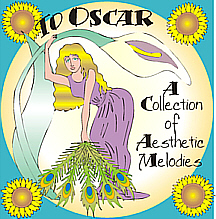THE OSCHOLARS
___________
Vol. IV No. 2
issue no 33: January 2007
'MAD, SCARLET MUSIC'
A monthly page dedicated
to Oscar Wilde and Music, compiled by Tine Englebert. Additionally, we will be looking at some
of the other operas of the period, or inspired by it.
Click for the main pages of this issue of THE OSCHOLARS
To Table of Contents | To hub page
|To THE OSCHOLARS home page
To go to previous pages of Mad, Scarlet Music, click as appropriate:
|
|
|
|
Before July 2002, ‘Mad, Scarlet Music’ was incorporated in the main pages of THE OSCHOLARS.
Click in the Table of Contents for direct access to
the information about each item.
I. Productions: SALOME
Bayerische Staatsoper München, Germany
3rd, 7th, 9th February
|
Herod |
|
|
Herodias |
|
|
Salome |
|
|
Jochanaan |
|
|
Narraboth |
|
|
Page |
|
|
Conductor |
|
|
Production |
|
|
Set |
|
|
Costumes |
|
|
Lighting |
|
|
Choreography |
|
|
Dramaturgy |
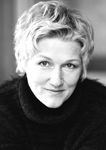
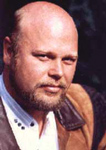
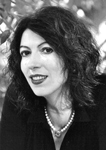
Angela Denoke Wolfgang Schmidt Iris Vermillion
(c) Monika Rittershaus
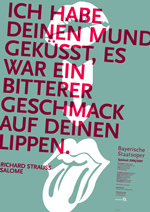
Salome/Das
Gehege
Bayerische Staatsoper,
München
(see
November/December Bulletin)
3rd, 7th, 9th February
2007
National Opera Athens, Greece
Stenz – Kabatu
Schaechter,
Protschka, Moeller, S. Young
11th
February
Teatro alla Scala Milano, Italy
6th,
8th, 10th, 11th, 13th, 15th, 18th March
New Staging: Production of the
‘ For Richard Strauss’s masterpiece, La
Scala prepares a new production by Luc Bondy with
sets by Eric Wonder, which re-examines their show already created at the
Salzburg Festival. This staging has become the Salome of
reference in the century-old history of this Straussian
title thanks to the public and critical success earned in the greatest theatres
in the world. Daniel Harding, the conductor of the Idomeneo
that opened last season, returns on the podium. Nadja
Michael has been chosen for the leading part next to Falk Struckmann
(Jochanaan). ‘
|
Herod |
Robert
Brubaker |
|
Herodias |
Iris
Vermillion |
|
Salome |
Nadia Michael |
|
Jochanaan |
Falk Struckmann / Mark S. Doss |
|
Narraboth |
Matthias Klink |
|
Daniel Harding |
Conductor |
|
Luc Bondy |
Production |
|
Erich Wonder |
Set |
|
Susanne Raschig |
Costumes |
|
Alexander Koppelmann |
Lighting |
|
Lucinda Childs |
Choreography |
Twenty-five photographs of this production are available on the Scala website. These not downloadable and need to be viewed using a Macromedia Flashplayer. To see them click here and then follow the link.
Salle Pleyel,
Paris
A concert performnce
|
Salome |
Nina Stemme |
|
Herod |
Chris Merritt |
|
Herodias |
Anja Silja |
|
Jokanaan |
James Johnson |
|
Narraboth |
Rainer Trost |
|
Marc Albrecht |
Conductor |
|
Orchestre Philharmonique de Strasbourg |
|
II. Productions : Zemlinsky
Der Zwerg
(The Birthday of the Infanta)
Theater Erfurt, Germany
11th,
24th February
Musical
Director: Walter E. Gugerbauer
Stage Director: Rupert Lummer
Set and Costume design: Hank Irwin Kittel
With Alla Perchikova (Donna Clara), Marisca Mulder (Ghita), Juan Carlos Mera-Euler (Don Estoban), Erik Fenton (Zwerg), Anja Augustin (Erste Zofe), Rosamund Cole (Zweite Zofe), Anne Schuldt (Dritte Zofe), Cornelia Nuernbergk (Erstes Mädchen), Astrid Thelemann (Zweites Mädchen)
A Florentine Tragedy
Opéra
National Montpellier, France
2nd, 4th (m)
March
|
Guido Bardi |
Robert Künzli |
|
Simone |
Pavlo Hunka |
|
Bianca |
Kate Aldrich |
|
Bernhard Kontarsky |
Direction musicale |
|
René Koering |
Mise en scène |
|
Giusi Giustino |
Costumes |
|
Patrick Méeüs |
Lighting |
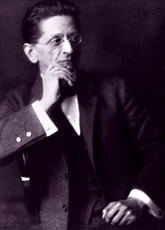
Alexander von Zemlinsky
Opéra National de
Lyon, France
Orchestre de l'Opéra
de Lyon
17th, 20th, 25th, 27th
April; 4th May
|
Guido Bardi |
John Daszak |
|
Simone |
|
|
Bianca |
|
|
Direction musicale |
|
|
Georges
Lavaudant |
Mise en scène |
|
Jean-Pierre
Vergier |
Costumes |
|
Georges
Lavaudant |
Lighting |
This
will be recorded by France
Musique
Iii. Singing Salome
In our edition of October 2006, we began to
compile a list of those who have sung Salome, with the intention of adding to
it subsequently and expanding it with dates and a bibliography. In December 2006 we added our first similar
list of Herods.
Tine Engelbert now provides the second
of her sketches of those who have sung Salome, the appropriately named Salomea Krushelnytska.
.
The first Salomes : Salomea Krushelnytska
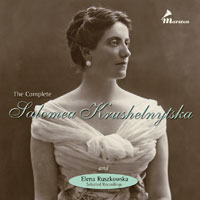
At the beginning
of the 20th century audiences at the major Italian theatres were mainly
interested in new operas of the verismo school. But also the operas of
Richard Strauss were played.
The queen of verismo
herself, Gemma Bellincioni, introduced Salome in Italy, creating the
role at the Teatro Regio, Turin, on
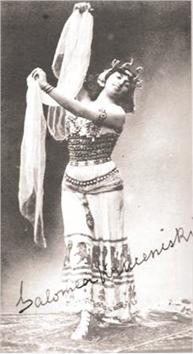
Salomea Krusceniski as Salome
The Ukrainian soprano Salomea Krushelnytska was one of the great dramatic sopranos of her time. She had one of the most beautiful dramatic soprano voices on record. The voice has strength and a dusky tone coupled with a mastery of phrasing. Critics praised Krushelnytska’s stage presence as often as her dramatically inspired vocal realizations, whether she was singing the leading soprano roles in Italian, French, German, or Russian opera. Her repertoire was eclectic, with a strong bias towards contemporary music. Krushelnytska had a remarkable career. It was rumored she could learn a part of a new opera in two days, and develop the character of a role in another three or four. Her fame spread from Russia to Italy. The musical circles in Europe and Americas recognized Salomea Krushelnytska as one of the greatest opera singers of first quarter twentieth century.
Krushelnytska was
born in western Ukraine, just outside of Lviv (then Lemberg), in 1872. Her
father was an Orthodox priest who was likely influenced by the rich liturgical
music tradition of the Church as well as the singing traditions of Ruthenian
and Carpathian culture. She was granddaughter of a
Ukrainian writer, Hryhoriy Savchynskyi. She made her operatic debut at Lemberg
in 1892 as Leonora in
Donizetti’s La Favorita, a role composed for mezzo-soprano. Over the
next several years, however, she exclusively sang soprano roles, including
Leonora in Verdi’s La Forza del Destino, Elsa in Wagner’s Lohengrin,
and Mimí in Puccini’s La Bohéme, performing in cities such as Odessa,
Krakow, Tblisi, Parma, and in parts of Chile. From 1898 to 1902 Krushelnytska
was the principal soprano at the Warsaw Imperial Theatre and was heralded by
Polish audiences especially for her interpretation of Aida. In 1896 she sang in Italy for the
first time. Krushelnytska was
popular in Italy between 1896 and her final retirement from the stage in 1920,
where she appeared and sang in numerous opera houses under the last name of
Krusceniski. Many critics especially praised her interpretation of the title
role in Aida, a role she performed already in 1898 at the Mariinsky
Theatre in St. Petersburg alongside Enrico Caruso, who was likely singing
Radames for the first time. In 1902 she won the hearts of Parisians in Lohengrin.
In 1904 Krushelnytska responded positively to a written request by Giacomo
Puccini to sing Madama Butterfly, in spite of the opera’s failure at its
debut in Milan. Krushelnytska embraced this new version to be given at the
Teatro Grand of Brescia, which, as at the opera’s premiere, would be conducted
by Cleofonte Campanini. Her interpretation of the role, as well as the opera
itself, was a huge success at that performance and thereafter, and her revival
of the tragic heroine earned her the enduring admiration and appreciation of
the composer. As we know she created the role of Salome at La Scala’s premiere as well as the role of Elektra in 1909. Afterwards
Krushelnytska enjoyed in Buenos Aires repeated operatic success and was deeply
appreciated by local audiences and music critics. Among her triumphs there were
Catalani’s La Wally and Brünnhilde
in Wagner’s Die Walküre, both conducted by Toscanini.
Krushelnytska’s
operatic successes continued into the beginning of the following decade,
especially back in Italy. In 1915 she created and premiered at La Scala the
title role in Pizetti’s Fedra. By this time Krushelnytska had decided to
devote herself to the study of song repertoire and curtailed her work in opera.
Her very last opera appearances were in Naples in 1920
(Lohengrin and Catalani’s Lorelea). By that time she had over
fifty operas in her repertoire. In 1923 she began the next phase of her singing career as a song
recitalist. Giving concerts in several countries, her repertoire was extensive,
including Ukrainian folk songs, for which she accompanied herself at the piano.
In 1928 Krushelnytska successfully toured the United States and Canada,
appearing in recital on the North American continent for the first time. In 1939 she came back to
Krushelnytska’s
achievements as a singer and dramatic interpreter at the beginning of the
twentieth century certainly allow her a place of prominence on any list of
great singers who unquestionably have advanced the art of singing and the
dramatic interpretation of opera and song literature.
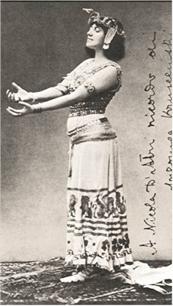
Salomea Krusceniski
as Salome
Source: http://www.marstonrecords.com/krushelnytska/krushelnytska_liner.htm
Beyond the Wilderness
A glance at some of the other operas with which Wilde’s contemporaries (and sometimes Wilde himself) would have been familiar; and those that derive from the works of the period.
Maeterlinck / Bartok : Bluebeard’s Castle
Opéra National de Lyon,
France.
19th, 22nd, 28th April; 3rd, 24th May.
|
Barbe-Bleue |
Peter Fried |
|
Judith |
Michaela Schuster |
|
Juraj Valcuha |
Direction musicale |
|
Mise en scène |
|
|
Costumes |
|
|
Lighting |
|
|
Décor |
|
|
Agathe Mélinand |
Dramaturgy |
Maeterlinck / Dukas : ARIANE Et BARBE-BLEU
Opéra Bastille, Paris
13th, 17th, 21st, 24th,
28th September; 2nd, 6th October
|
Willard White |
Barbe-Bleu |
|
Deborah Polaski |
Ariane |
|
Felicity Palmer |
Nurse |
|
Diana Axentii |
Sélysette |
|
Iwana Sobotka |
Ygraine |
|
Hélène Guilmette |
Mélisande |
|
Jaël Azzaretti |
Bellangère |
|
Conductor |
Sylvain Cambrelin |
|
Director, set, costumes |
Anna Viebrock |
|
Lighting |
David Finn |
|
Dramaturge |
Malte Ubenauf |
|
Choirmaster |
Peter Burton |
|
Orchestra & Choir of the Orchestre National
de Paris |
|
Maeterlinck / Debussy : Pelléas et
Mélisande
Staatstheater Mainz
4th,
9th, 11th, 25th, 27th February 2007
Musical director: Catherine
Rückwardt
Director: Sandra Leupold
Decor and
costumes: Moritz Nitsche
(Information supplied by Lucia Krämer)
Det kogelige Teater / The Royal Theatre, Copenhagen, performed
in French with Danish supertitles.
25th,
28th February; 4th, 7th, 9th, 12th,17th, 21st, 23rd, 28th, 31st March.
|
Arkel |
|
|
Pelléas |
Palle Knudsen/Gérard Théruel |
|
Golaud |
|
|
Geneviève |
|
|
Mélisande |
|
|
Yniold |
|
|
A doctor |
|
|
Karen Kamensek |
Conductor |
|
Guy Joosten |
Stage
director |
|
Johannes Leiacker |
Set
designer |
|
Jorge Jara |
Costume
designer |
|
Davy Cunningham |
Lighting
designer |
|
Luc Joosten |
Dramaturgy |
‘Impressionist composer Debussy was the Monet of music. He
paints the score of Pelléas et Mélisande with fine
brushstrokes and nuances, using transparent, celestial notes to probe the
depths of human consciousness in a love ménage-à-trois between a mystical,
ethereal woman and two half-brothers.’
–Luc Joosten
Opéra Royal de
Wallonie – Liège, Belgium
9th,
11th (m), 13th, 15th, 17th March
|
Arkel |
Antoine
Garcin |
|
Pelléas |
Jean-François
Lapointe |
|
Golaud |
Marc
Barrard |
|
Geneviève |
Anne
Pareuil |
|
Mélisande |
Anne-Catherine
Gillet |
|
Yniold |
Elena
Poesina |
|
A doctor |
Léonard Graus |
|
Shepherd |
Patrick
Pircak |
|
Patrick Davin |
Conductor |
|
Philippe Sireuil |
Stage
director |
|
Didier Payen |
Set
designer |
|
Jorge Jara |
Costume
designer |
|
Philippe Sireuil |
Lighting
designer |
|
Edouard Rasquin |
Choirmaster |
|
New production Opéra Royal de Wallonie |
|
Royal Opera
House Covent Garden, London, England; sung in French with English surtitles; to see a video clip (6 mins
23 secs), click here.
www.roh.org.uk
11th, 14th, 16th, 19th, 21st,
23rd May.
“ Simon Rattle conducts, leading international interpreters bring the enigmatic
characters alive, all in an important new co-production with the Salzburg
Easter Festival: Debussy's deeply haunting opera Pelléas
et Mélisande - one of the greatest of 20th-century
masterpieces - receives lavish attention from The Royal Opera this Season. This
will be your last opportunity to experience in the theatre Simon Keenlyside's internationally acclaimed portrayal of Pelléas, while Angelika Kirchschlager
as Mélisande, Robert Lloyd as Arkel
and Gerald Finley as Golaud combine to make for a
truly inspirational cast.
Debussy's music combines with Maeterlinck's play to
form fluid, intricate patterns of impressions, suggestions and suppressed
emotions that evoke this distant setting of Allemonde,
its king and its court. Concealment, evasion and silence prove revelatory as
events unfold. The beautiful and sorrowful Mélisande,
veiled in mystery, marries Golaud, but falls deeply
in love with his half-brother Pelléas. The blind King
Arkel senses the tragedy of destiny that surrounds
his grandson's new wife, but is unable to prevent its fulfillment.
Stanislas Nordey's new
production uses striking modern tableaux, the symbolism of colour and the drama
of light for a 21st-century insight into these timeless undercurrents of the
human heart. A dream-like setting, intoxicating sound and
dream casting - but a very real indulgence and pleasure. ”
|
Arkel |
Robert Lloyd |
|
Pelléas |
Simon Keenlyside |
|
Golaud |
Gerald Finley |
|
Geneviève |
Catherine Wyn- |
|
Mélisande |
Angelika Kirchschlager |
|
Yniold |
tbc |
|
A doctor |
Robert Gleadow |
|
Sir Simon Rattle |
Conductor |
|
Stanislas Nordey |
Director |
|
Emmanuel Clolus |
Set
designer |
|
Raoul Fernandez |
Costume
designer |
|
Philippe Berthomé |
Lighting
designer |
Haitink – Engel
Djelloul, Kozena, Lemieux,
Lapointe, Naouri, Reinhart
Paris Théâtre des
Champs-Elysées, Paris, France
14th, 16th, 18th, 20th,
22nd June
|
Arkel |
Gregory Reinhart |
|
Pelléas |
Jean-François
Lapointe |
|
Golaud |
Laurent Naouri |
|
Geneviève |
Marie-Nicole
Lemieux |
|
Mélisande |
Magdalena Kozena |
|
Yniold |
Amel Brahim
Djelloul |
|
Bernard Haitink |
Conductor |
|
Jean-Louis Martinoty |
Director |
|
Hans Schavernoch |
Set
designer |
|
Yan Tax |
Costume
designer |
|
André Diot |
Lighting
designer |
|
Orchestre
National de France |
|
Ballet
Proust ou les
intermittences du cœur, Roland Petit’s ballet based on A La
Recherche du Temps Perdu, is mounted
at the Palais Garnier, 1st to 31st March.
Conference: Victorian Soundscapes
Leeds, 16th/17th March 2007
A two-day conference jointly hosted by
Leeds University Centre for English Music / Leeds Centre for Victorian Studies
Sponsored by the British Academy and the British Association for Victorian
Studies
Speakers include John Picker (Harvard University), Stephen Banfield
(University of Bristol), Delia da Sousa Correa (Open
University), Rachel Cowgill (University of Leeds),
Matthew Bevis (University of York), Phyllis Weliver
(Wilkes University), Michael Allis (University of Leeds).
All participants will receive a copy of volume 8 of the Leeds Working Papers in
Victorian Studies, which includes a selection of the papers presented at the
colloquium.
For further details of registration details, please see www.leedstrinity.ac.uk/lcvs/colloquia/soundscapes.html
or contact:
Professor Martin Hewitt, Director, Leeds Centre for Victorian Studies, Trinity
and All Saints, Brownberrie Lane , Leeds , LS18 5HD
Programme
Friday 16th March at the School of Music, University of Leeds
12.30 Lunch
1.30 Roundtable: Victorian Soundscapes and the
Potential for Interdisciplinary Exchange
(Participants to include John Picker (Harvard), Stephen Banfield
(Bristol), Rachel Cowgill (Leeds), Delia da Sousa Correa (Open))
3.00 Keynote Seminar
Matthew Bevis (York) The Art of Eloquence: Byron, Dickens, Tennyson, Joyce’
4.00 Tea
4.30 Concert Lecture:
Clive Brown (Leeds), 'The Victorian Concert Experience: a selection of
instrumental and vocal music'
Saturday 17th March at Trinity and All Saints, Horsforth
9.00 Coffee and Welcome
10.00 Keynote Lecture
John Picker (Harvard): ‘Victorian Soundscapes
Revisited’
11.00 Session 1: Repertoire and Class
David Milsom, 'Elevated Aspirations versus the
Limitations of Reality: String Playing Style and Practice in Victorian England'
George Kennaway ‘Phenomenon of the Cellist Auguste van Biene: from the
Charing Cross Road to Brighton via Broadway’
11. 45 Session 2: Silences
Rhian Williams, ‘'Our deep dear silence': Marriage
and Lyricism in Elizabeth Barrett Browning's Sonnets from the Portuguese’
Louise Lee, ‘Voicing, De-voicing and Self-Silencing: Charles Kingsley's
Stuttering Christian Manliness’
12.30 Lunch
1.30 Session 3: Industrial Sounds
Christopher Loutit, ‘'Pleasant Music' or Discordant
Din? The Sounds of Industry in Dickens and Gaskell’
Michael Allis, ‘Challenging the Victorian musical soundscape:
'progressive' repertoire and the 'Working Men's Society'‘
2.15 Session 4: Fin de Siecle and Beyond
Brad Eden, ‘Strains of Elvish song and voices:
Victorian medievalism, music, and J.R.R. Tolkien’
Julia H. Schröder , ‘Mendelssohn and the
'Doppler-Effect' in Music’
3.00 Session 5:
Phyllis Weliver, ‘‘Musical Diplomacy and Mary
Gladstone's Diaries’
Karen Yuen, ‘Instruments of Ambivalence: Dante Gabriel Rossetti and Aural
Anxiety after 1860’
3.45 Tea
4.15 Session 6: Civic Music
Rachel Milestone, ‘'The Exponent of the Life and Soul of the City': The Town
Hall as a Music Venue in the Nineteenth Century’
Rachel Cowgill, 'On the beat: the Victorian policeman
as musician.'
Martin Hewitt
M.Hewitt@leedstrinity.ac.uk
Leeds Trinity & All Saints
40 Years of Learning 1966 - 2006
Celebrate with us, find out how at www.leedstrinity.ac.uk/forty
Click for the main pages of this issue of THE OSCHOLARS
To Table of Contents | To hub page
|To THE OSCHOLARS home page
